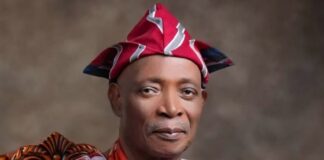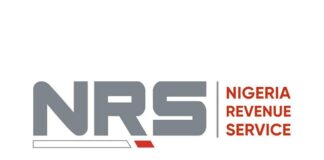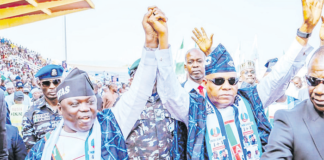PRESS STATEMENT
Reports credited to the Minister of Education, Prof. Tahir Mamman of the resolve of President Bola Ahmed Tinubu’s administration to enhance Annual National Budget to the education sector by Twenty Five percent (25%) is highly commendable and heart-warming to concerned, stakeholders in the sector.
Though further clarifications may be necessary to determine the actual percentage of the Annual National Budget that the education sector would be in the long run.
This intention of the government is considered as meeting mid way, the age long agitations by education activists for adequate funding of education in the country. While this plan may not necessarily have global benchmark requirements of Fifteen to Twenty Percent (15%-20%) recommendations by the United Nations Educational, Scientific and Cultural Organisations, UNESCO, it is a quantum leap beyond the miserly less than 10% allocations year in, year out during long interregnum of military absolutism and, perhaps, paltry allocations since the return of democratic governance since 1999. It is expected that State Government would follow the steps of the Federal Government in prioritising investment in the Sector.
This allocation, according to the Minister would be complemented with other educational policy reforms to rejig towards actualising the President’s campaign promise of ensuring that education in the country is re-tooled to meet industrial needs. He made these revelations at the 2021/2022 Nigeria Annual Education Conference, NAEC. Mamman said the Federal Government’s education policy thrust is geared towards the attainment of ‘Education 2030 Agenda for Sustainable Development’ and return over 10.5 Million out of school children to school at the end of the President’s tenure. Perhaps, it should be added that a well funded education sector would drastically reduce if not eliminate the brain drain crisis in our tertiary institutions.
It is trite to emphasise that any society that is serious about taking giant strides in attaining socio-economic, technological and industrial advancements always give premium advancement to qualitative education of citizens. Besides the advanced industrial worlds in Europe and the United States of America, emerging global powers like Asian Tigers’ countries, India and Brazil spends large amounts of their annual expenditure on education, research and development, sometimes even more than the global benchmark by UNESCO Recommendations. An investment which has positioned India Nationalities as leading global players in most global institutions.
Education is plays critical roles in entrenching constitutional peoples’ democracy. The truism of this, is tested in the fact that informed citizens drive social advancement goals, based on the trite logic that, ‘Education makes citizens, easy to govern but difficult to rule. A well enlightened citizen is fully cognisance of social rights, duties, obligations, and responsibilities arising from citizenship. Such a fully aware citizen can always stand against tyrannical rule, and this is the kernel of our Maxim in the National Observatory – NO to Tyranny! More importantly, tyrannical values are antithetical to constitutional, democratic administration of society.
We are thus, apt to observe that the education reform policy may be kick-started with adequate funding, but this is not sufficient to sustain the reforms. The Federal Government must urgently reexamine its neo liberal economic policies in the sector. All over the world, education is considered as a form of social investment that cannot be left to the vagaries and dictates of market forces.
The commercialisation of education in the country would not augur well for our wholesome growth and stable polity. This administration must put on its creative thinking caps to explore wider areas of comprehensive funding of the education sector. Areas such as the Petroleum Tax Funds, Education Tax Funds, Property Tax should be overhauled, harnessed to percolate effectively in addressing fundamental educational needs of the country. Grants, Corporate Research Investment portfolios should be fully tapped into to fund the sector. More importantly, the clamour for autonomous, democratic management of our tertiary institutions must be accorded unfettered recognition and full execution.
We note with concern, the surge of the practices of hikes in tuition fees and sundry levies in the nation’s tertiary institutions. This has caused students’ protests in several institutions like the National Open University of Nigeria, NOUN, Polytechnic Ibadan, University of Lagos etc. For education to serve its social purpose, it can never be reduced to commercial commodity.
We demand that the Federal Government must urgently call Managements of our higher institutions to order on their zeal to hike school fees and other levies in their institutions. This is even, much more imperative against the background of untold hardships Nigerians are experiencing because of recent reforms with the removal of oil subsidy.
Nigerians deserve policy relieves, not additional burdens. The over pampered, upper echelon Citizens earning above Five Million, N5 Million per Annum can be taxed special Citizens Education Support Tax to fund the Sector instead of imposing harsh regimes of commercialised education policies on our higher citadel of learning.
Also, we urge the government to take a thorough, critical look at the Students’ Loan Act. The signing of this Act was one of the first bills signed into law by President Bola Ahmed Tinubu. We are aware that the Government and Ministry of Education are re – examining the implementations processes of this Act.
We join the larger communities of concerned, patriotic Nigerians who have raise their voices against salient, socially injurious provisions of this Act. Indeed, the Loan scheme is riddled with plans to totally divest itself from funding education, placing the burden on the students. It also crafted in such a way that it is practically impossible for the common, average or low-income earning citizens to access the loan. We call on President Tinubu to give a directive to halt the execution of planned Students’ Loan Scheme, pending resolutions of the vexatious provisions and expunging of the sections placing huge future burdens on the students.
We are seizing this opportunity to remind the Federal Government that the windows and doors for consultations are permanently open in a democratic dispensation.
We therefore, call for unceasing, democratic consultations with social partners in the education industry over all contentious issues of funding, autonomy, salaries arrears, unpaid salaries of striking workers like the ASUU members and any other issues. Stability and continuity are vital desideratum for socially relevant educational system if the nation must attain set developmental goals.
Comrade Debo Adeniran
President
Omotaje Olawale Saint
Administrative Secretary









